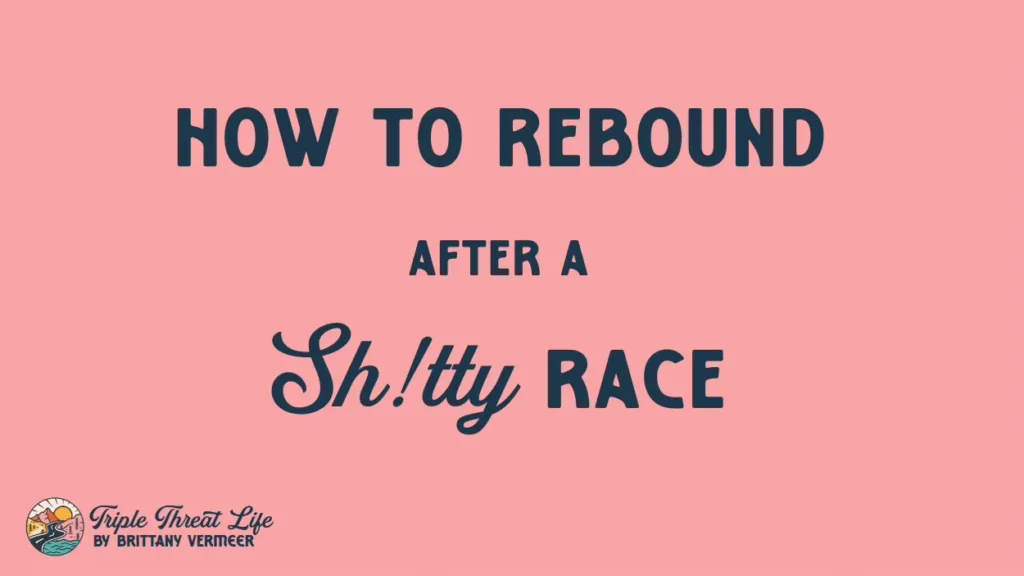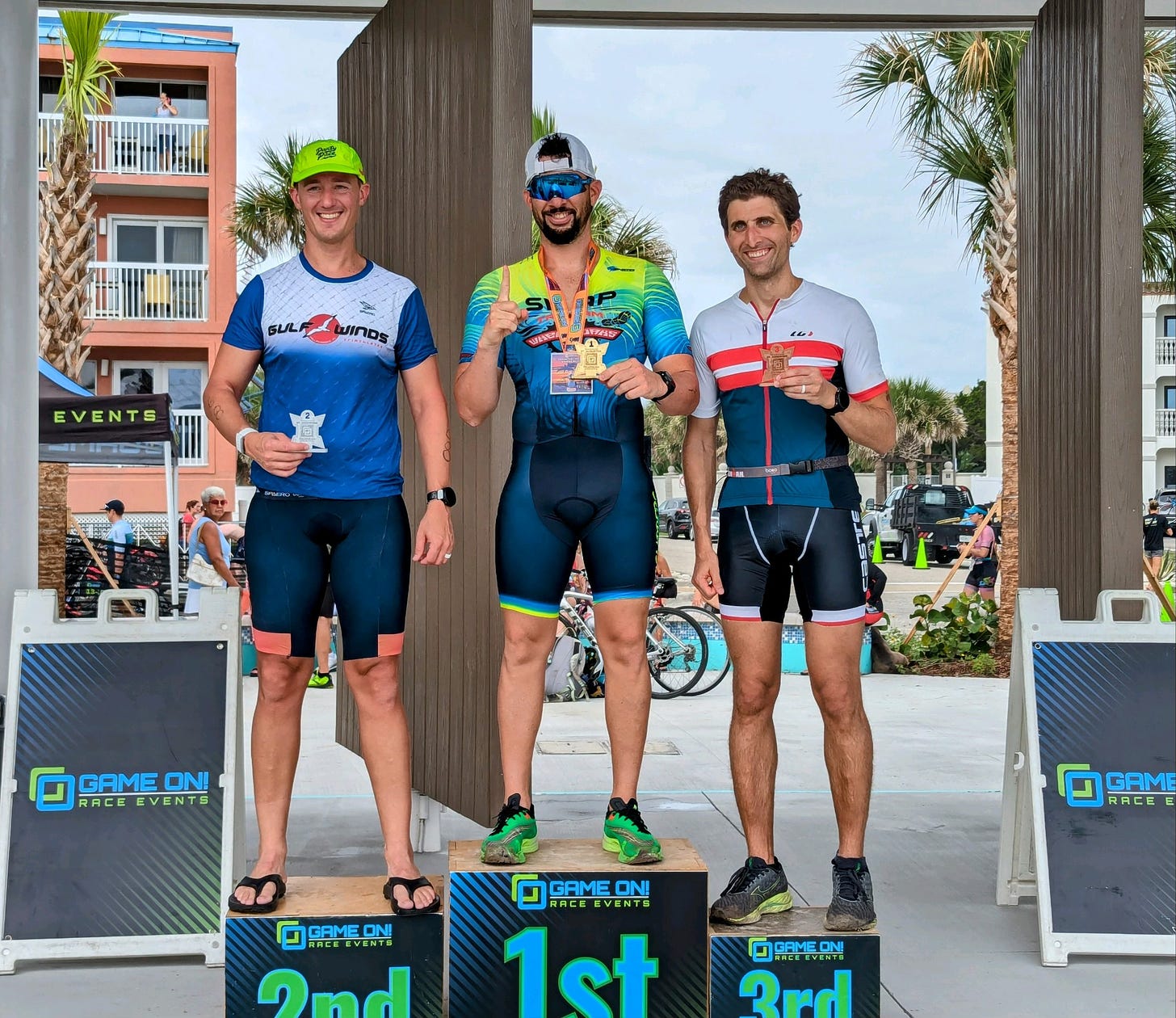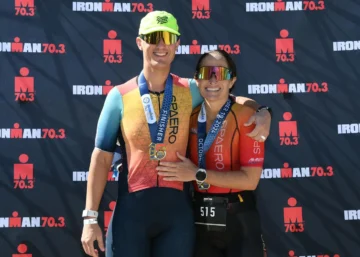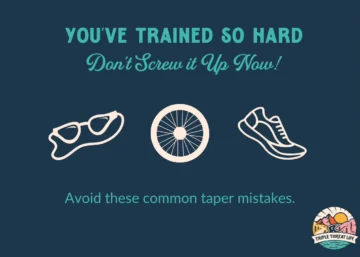
The great part about having a triathlon blog is that I get to tell you about the fun times- when it’s all rainbows and sunshine, you get a shiny new PR, and stand on top of the podium.
The flip side is that I also have to write about the horrible, no good, very bad days. The total sh!t races.
I could just gloss over the bad things that sometimes happen in this sport, but it seems disingenuous. And that doesn’t help anyone. (It doesn’t help me and it certainly doesn’t help anyone reading this newsletter who’s looking for insight and honesty.)
My husband told me the title of this post should be “How to Recover After a Terrible, Horrible, No Good, Very Bad Race” as a nod to the popular children’s book with a similar title. Like Alexander who got gum in his hair, had to eat lima beans for dinner, and lost his marble down the drain, I have a similar feeling about the triathlon I did on Sunday.
But I feel like my title more accurately sums up how I feel about the race. Less cute, more dumpster fire. So here we are.
But bad days do happen. (See Exhibit A- 70.3 Chattanooga last year when I was on track for a big PR and projectile vomited at mile 8 of the run thanks to a nutrition malfunction.)
I don’t have a problem writing about the bad, mostly because putting my thoughts down on paper is cathartic. It’s a way for me to process my emotions, analyze what went wrong, make a plan, and move on.
But also because this is real life.
In this sport I can guarantee that you’re going to have amazing, glorious, incredible experiences. I can also guarantee that you’re going to have terrible, horrible, no good, very bad days.
That’s triathlon. That’s life.
What happened at the race
Honestly, I haven’t had a great race yet this year (mostly due to a minor injury disruption) so the Olympic this past Sunday was a last ditch effort to get a solid race under my belt with a bit of speed before we transition to long distance events in the fall.
Perhaps doing an Olympic at the end of July wasn’t the best plan, but we live in Florida and it’s hot. Can’t do anything about that. (Wish I could, but I can’t. Or maybe we could move to Alaska…)
Knowing this was going to be a hot and humid race, we purposefully made a plan to back off on the bike so I could have a good run.
The swim was great, pretty hard actually, but great. Two laps in some challenging waves with a breaker section that would knock you sideways, but great. I like open water, so hard swims don’t phase me. This one had an extended run on the beach in between each lap, so that was weird, but fine.
The problems started on the bike. As soon as I started pedaling, I knew something was wrong. I couldn’t push power. There was just nothing there. I could barely hold my Ironman power, which was very odd, but my RPE and heart rate were both high. Confusing and frustrating, but I tried to focus on the real purpose for this race- to have a good run.
So, I drank my carb/electrolyte mix and poured ice water on my head throughout. I started feeling a bit better coming back into T2, but things weren’t looking too promising. Still, I’ve had a bad bike and a great run before, so I try to remember to be patient, reserve judgement, and take each event as it comes.
Unfortunately, it got worse. I got off my bike and was so dizzy I had to stand in T2 for a minute to get my bearings before I walked out of transition. I thought I would try to run and started at an easy pace. I got about 1/4 of a mile, and it quickly became clear that my body wasn’t going to cooperate.
The next six miles that followed weren’t run-walk. They were walk-run. About 30 seconds of running followed by a minute of walking, and repeat.
I felt dizzy, my vision was off, and my hearing was muffled.
This was a two-lap course and I actually considered not starting the second lap. I questioned whether or not I could make it back to the finish line.
Now there’s no shame in deciding not to finish a race. Sometimes, for health reasons or circumstances out of your control, it’s the best option. I’m smart enough to know that. But in this case, I also knew that it was just 3 more miles. I could walk 3 miles easily enough.
Not finishing was going to do more damage mentally than walking 3 miles was going to do physically, so I chose to keep going. Now if it was a 70.3, I would’ve had to make a different decision, because I wouldn’t have been able to cover the distance in that state.
I also knew that my husband was out on course and he saw what was happening, so he’d be back to collect me after he crossed the finish line. (It’s our post-race routine.)
He stayed with me for the last mile and was a bit frustrated that I kept trying to run off and wouldn’t walk next to him. I remember saying that I just wanted it to be over.
It’s a really weird feeling to be in sight of the finish line and not be able to run towards it. But I did run for about 50 yards, across the finish line and straight over to the paramedics where they hooked me up a single-lead ECG.
While they were putting a blood pressure cuff on my arm and checking my oxygen saturation, they asked if this is how I normally feel after these races.
I said, “No, I was supposed to finish an hour ago.” Apologies for the snark… I wasn’t in a good place.
My blood pressure was low, but other than that my heart looked fine. They couldn’t check my electrolyte levels or blood volume (which I suspect was pretty bad) on site, and I certainly wasn’t going to the ER for that. So I sat and drank 4 mini-Gatorades with a bag of ice on my neck until I could walk under my own power.
The post-race analysis
The weird thing about what happened is that it came as a total surprise.
I’m fit. I know I am. My coach has given me some pretty challenging bike workouts and hard runs lately as we prepare for 70.3 NC in October.
I can run in the heat. I suffer because of my high sweat rate, but I can do it. I’ve been logging miles in 90+ degrees with 90+ humidity. It sucks, but I get it done.
When something like this happens, my first instinct is to feel confused, then frustrated, defeated, sad, pissed off, and then angry. All of these emotions are fine. You have to give yourself time to feel what you feel and know that it’s ok. Typically, I give myself 48 hours to cry, yell, whine, whatever and then we move on.
The next step is analyzing what went wrong. This is the hardest part, because there are so many factors involved and sometimes it’s not clear, but it’s the most important.
It’s only a failure if you didn’t learn something.
“It’s not a matter of if we fail but when we fail. And one of the key differences between winners and losers is in how they respond to those failures. Losers use failure as a reason to quit. Winners use failures for good. As one winner so aptly said, ‘I’ve had a lot of success with failure.’”- Dr. Alan Zimmerman
In looking back at what happened, I see a few minor things that went wrong.
- We drove three hours to the race venue on Saturday and walked around for two hours in the heat before athlete check-in. We tried to drink as much as we could, but it’s hard when you’re traveling.
- We didn’t have a great pre-race dinner. My meal was a bit spicy, so I didn’t eat a lot. That may have lead to being a bit underfueled.
- We had a moron knock on our door at 2 am, which woke us up, so we got 5 hours and 45 minutes of sleep. Not the least I’ve gotten before a race, but not the best either.
- I was probably a half bottle shy of my goal intake on the bike, so likely that contributed to the issue on the run. But it’s still odd to have that dramatic of a reaction after only 1 hour and 39 minutes of racing.
All small things, but perhaps the small things added up and caused something big.
None of this really accounts for the weird feeling of not being able to push power on the bike. It may be as simple as switching up my taper week routine just a bit so my legs don’t have two days off before a race. (I’m a diesel and take a long time to warm up anyways).
Luckily, I have a doctor at home, so we also tried to analyze my physical symptoms on the run. My husband says the most likely culprit is heat stress and dehydration. So we’re planned to increase sodium even more than what I already take in.
What to do when you have a sh!tty race, workout, work day, ect.
So that brings me to the actual steps to take when you have a sh!tty race, workout, day at work, ect.
- Give yourself time to process emotions. (24-48 hours) Don’t judge what you’re feeling, just acknowledge it and then let it go. Talking with someone or writing about your feeling can help. If you can give words to the emotions, you can get them out of your head so you stop ruminating.
- Analyze what happened. This is why I’m such an advocate for writing a race report. If I didn’t write a race report, there’s no way I would remember the small details of this race two weeks from now. What I ate, how much I drank, my RPE, what I felt, ect. If I don’t remember the details then how can I expect to learn from the experience?
- Determine what might have gone wrong. Certainly some days can be chalked up to “just having an off day.” But I believe, more often than not, there’s a reason (or multiple reasons) why we fail to perform. Try to figure out what the reason might be. If you don’t care enough to figure out why, then you don’t care if it happens again. There has to be some accountability.
- Make a plan and move forward. There’s something to be said for keeping things in perspective. This is a hobby after all. A bad race isn’t the end of the world. However, we spend a lot of time training for these events and we put a lot of effort and dedication into the process (not to mention a lot of money). My husband and I both have big goals and want to push our limits. Therefore, the final step is coming up with a plan, making any necessary adjustments, and moving forward with confidence.
Know this: A single performance doesn’t define you as an athlete, whether it’s good or bad. You can soar just as quickly as you can crash and burn.
A bad race or a bad workout doesn’t necessarily reflect poorly on your fitness. Perhaps you just haven’t had the opportunity to express it yet.
All this being said, I’m not going to spoon-feed you some 5th grade inspirational poster crap and tell you there’s no such thing as failure. Because there is. Failure is a very real thing. Failure is when you quit. Failure is when you give up.
As long as you keep trying, there’s no way you can fail.
But you don’t have to take my word for it. Check out what Jason, Ben, and Lucy had to say about their recent bad days.
PS. Matt had a great race and was 2nd out of 18 in a really hard age group, so I’m very proud of him!






